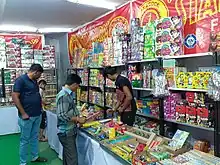

A firecracker (cracker, noise maker, banger,[1]) is a small explosive device primarily designed to produce a large amount of noise, especially in the form of a loud bang, usually for celebration or entertainment. They have fuses, and are wrapped in a heavy paper casing to contain the explosive compound. Firecrackers, along with fireworks, originated in China. They are easily available in India and are used to mark a celebratory event. Anyone 18 and over can buy them without a license if allowed by the local laws.
Diwali fireworks are a family event in many parts of India.[2] People light up fireworks near their homes and in streets. Additionally, cities and communities have community fireworks.
History
This custom may have begun on the Indian subcontinent after 1400 CE when gunpowder started being utilised in Indian warfare.[3]
India's first fireworks factory was established in Calcutta during the 19th century. The creator of this invention was man named Gopal Mahindram [4]
Pollution concerns
In October and November, farmers from Punjab and Haryana burn stubble and other agricultural waste and the weather tends not to be windy, so Delhi's air pollution usually increases, which has been a major environmental problem since 2002.[5] Toxic smog generated during the burning of the firecrackers during Diwali festival can worsen this pollution.
Ban on firecrackers
In October 2017, the Supreme Court banned firecrackers in Delhi, as a result of which the industry said it faced losses of Rs 1,000-crore and consequently layoffs.[6]
After India's National Green Tribunal (NGT) ordered a ban in the NCR region on the sale and use of crackers in 2020, the Council for Scientific and Industrial Research (CSIR) developed "green crackers" that used less polluting raw materials. Several states in India have either banned firecrackers or limited the time, noise level and type (mandatory use of less polluting firecrackers) that can be used.[7] Nonetheless, many firecrackers were used to celebrate the Diwali holiday in 2020, immediately after which Delhi's air pollution was over 9 times the level that the World Health Organization considers safe.[5]
Aaratrika Bhaumik writing for the website "livelaw.in" mentions the ban put in place by the Calcutta High Court on firecrackers (green firecrackers included) throughout the state of West Bengal for the 2021 Diwali and Kali Puja festivities. The ban extends to all remaining festivals in the year, such as, Chhath Puja, Guru Nanak Jayanti, Christmas and New Year's.[8]
Green or environment friendly firecracker
After India's National Green Tribunal (NGT) enacted a ban on the sale and use of crackers on Diwali festival in 2020, the Council for Scientific and Industrial Research (CSIR) developed green crackers made from cleaner raw materials which reduce emissions by suppressing the production of dust; their emissions are 30% lower and are also are of reduced loudness at 110-125 decibels instead of the more than 160 decibels of traditional firecrackers. However, green crackers still contain harmful pollutants such as aluminium, barium, potassium nitrate and carbon.[7]
2022 appeal in Supreme Court
The Delhi government had decided to stop the production, storage, sale, and use of all types of firecrackers to reduce the rising levels of pollution in Delhi. In September 2022, Manoj Tiwari, a BJP politician moved the Supreme Court against the Delhi government. Tiwari said that that freedom of religion cannot be taken away under the pretext of the right to life.[9] Supreme Court refused to provide an early hearing for the petition and dismissed the plea saying "Let People Breathe Clean Air".[10][11] SC also asked the public to use the money on sweets instead of crackers.[12]
References
- ↑ Miller, John (June 2015). The Essential Lingo Dictionary: of Australian words and phrases. Exisle Publishing. ISBN 9781775592266. Retrieved 29 May 2017.
- ↑ "Til oil bath marks Chhoti Diwali celebrations". The Times of India. 3 November 2013. Archived from the original on 5 December 2013.
- ↑ "A brief and crackling history of fireworks in India". The Indian Express. 14 November 2020. Retrieved 17 November 2020.
- ↑ "A brief and crackling history of fireworks in India". The Indian Express. 14 November 2020. Retrieved 18 December 2021.
- 1 2 "Northern India chokes on toxic smog day after Diwali festival". CNN. Reuters. 15 November 2020. Retrieved 15 November 2020.
- ↑ "SC ban on firecrackers: Industry stares at Rs 1,000-crore loss, layoffs". hindustantimes.com/. 9 October 2017. Retrieved 9 October 2017.
- 1 2 "What are green firecrackers? All you need to know". Hindustan Times. 13 November 2020. Retrieved 21 October 2022.
- ↑ Bhaumik, Aaratrika (29 October 2021). "Calcutta High Court Bans Firecrackers In West Bengal During Diwali & Other Festivals". www.livelaw.in. Retrieved 29 October 2021.
- ↑ "BJP MP Manoj Tiwari Moves SC Against AAP Govt's Decision To Ban Firecrackers In Delhi". www.outlookindia.com. 21 September 2022. Retrieved 21 October 2022.
- ↑ "No urgent SC hearing on Delhi cracker ban; 'Let people breathe, spend money on sweets'". Hindustan Times. 20 October 2022. Retrieved 21 October 2022.
- ↑ "'Let People Breathe Clean Air': SC Dismisses BJP Leader's Plea Against Cracker Ban In Delhi". www.outlookindia.com. 20 October 2022. Retrieved 21 October 2022.
- ↑ "Evening brief: 'Spend money on sweets', says SC on Delhi cracker ban hearing; all the latest news". Hindustan Times. 20 October 2022. Retrieved 21 October 2022.